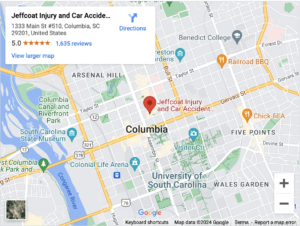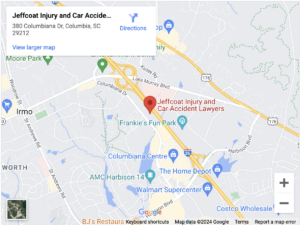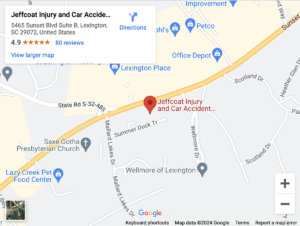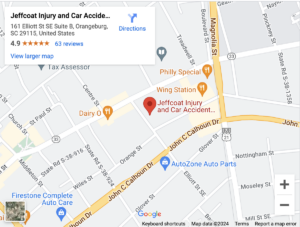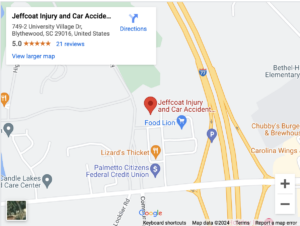July 22, 2025 | Columbia Personal Injury Blog \ Uber Accident Lawyer Near You

When Your Rideshare Trip Becomes a Nightmare: What South Carolina Riders Need to Know
The convenience of tapping your smartphone and having a ride appear within minutes has transformed how we travel around Columbia and beyond. However, as transportation network companies (TNCs) like Uber and Lyft have become fixtures in our daily lives, ride-sharing accidents have also increased across South Carolina. These incidents often leave passengers, other drivers, and even pedestrians wondering who’s responsible and what steps to take next. The confusion is compounded by the unique insurance challenges of rideshare services, where personal vehicles are used for commercial purposes, creating coverage gaps that can leave victims without proper compensation. Whether you were a passenger in a rideshare vehicle, a driver hit by one, or even a rideshare driver yourself, understanding your rights after an accident is crucial to protecting your future.
Don’t let the complexities of a rideshare accident leave you in the lurch. At Jeffcoat Injury and Car Accident Lawyers, we’re here to help you navigate the insurance maze and secure the compensation you deserve. Reach out today at (803) 200-2000 or contact us to discuss your case and explore your legal options.

The Complex Legal Landscape of Rideshare Accidents in South Carolina
South Carolina law treats rideshare accidents differently from typical auto collisions, creating a maze of regulations that can be difficult to navigate without proper guidance. You deal with multiple potentially liable parties and insurance policies when you’re involved in a rideshare accident. Transportation network companies (TNCs) like Uber and Lyft use a mobile technology model that connects passengers with drivers using their vehicles for commercial transportation. This hybrid model has created significant challenges for traditional insurance frameworks, as the risks associated with ridesharing don’t fit neatly into insurers’ current risk-pooling models. The industry is still working to address a notable gap in insurance coverage for rideshare drivers through skilled rideshare insurance options. Understanding which policy applies—the driver’s insurance, the rideshare company’s coverage, or some combination—depends entirely on what the driver did during the accident. Were they waiting for a ride request? En route to pick up a passenger? Or actively transporting someone? Each scenario triggers different coverage levels and liability considerations under South Carolina law, making these cases particularly complex for accident victims seeking compensation.
Critical Steps to Take Following a Rideshare Accident in Columbia
The moments and days following a rideshare accident are critical to protecting your legal rights and building a strong foundation for any potential claim. Many victims make the mistake of waiting too long to take action, which can significantly impact their ability to recover compensation. Programs like the Greater Region Mobility Initiative (GRMI) have developed resources to increase mobility opportunities for non-driving populations across multi-county regions. Still, these programs don’t address what happens when accidents occur. Following these essential steps can help ensure you’re protected throughout the claims process:
-
Seek immediate medical attention, even for seemingly minor injuries. Rideshare accidents often cause delayed-onset injuries like whiplash or concussions that may not be immediately apparent.
-
Document everything at the scene, including photos of all vehicles, road conditions, and your injuries. The rideshare company’s app will record your trip, but capturing your evidence is crucial.
-
Report the accident through the rideshare app immediately. This creates an official record and may trigger the company’s insurance coverage, which can provide up to $1 million in liability coverage when a driver is transporting a passenger.
-
Identify whether the driver was in “Period 1” (app on, waiting for ride request), “Period 2” (en route to pickup), or “Period 3” (passenger in vehicle), as this determines which insurance policy applies. This is a critical distinction that many victims don’t realize impacts their compensation options.
-
If applicable, Contact South Carolina’s Guaranteed Ride Home Program, which reimburses registered users 80% of the cost of a ride service in emergency situations up to four times in a 12-month period—a little-known benefit for those registered with regional Rideshare Programs.
How a Columbia Rideshare Accident Lawyer Can Navigate the Insurance Maze
The aftermath of a rideshare accident often involves dealing with multiple insurance companies, each trying to minimize its liability. This is where having dedicated legal representation becomes invaluable. At Jeffcoat Injury and Car Accident Lawyers, we understand the unique challenges that rideshare accident victims face in South Carolina. The insurance situation for rideshare drivers and passengers exists in a gray area that traditional policies weren’t designed to address. While rideshare companies provide some coverage, significant gaps are depending on whether the app was active and whether a passenger was in the vehicle at the time of the accident. A knowledgeable Columbia rideshare accident lawyer can identify all potential sources of compensation, including the driver’s policy, the rideshare company’s commercial coverage, and even your own uninsured/underinsured motorist protection. We can also help determine if any violations of South Carolina’s transportation regulations might strengthen your claim. With the right legal strategy, you can overcome the insurance hurdles that often leave rideshare accident victims undercompensated for their injuries and losses.
Understanding the Three Periods of Rideshare Insurance Coverage in South Carolina
One of the most confusing aspects of rideshare accidents is understanding which insurance policy applies at the time of the collision. This is determined by what’s known as the “period” the driver was in when the accident occurred. South Carolina law recognizes these distinct periods, each with different insurance implications. The risks associated with participating in ride-sharing services are not yet completely understood by the insurance industry, which means victims often encounter resistance when seeking fair compensation. Knowing which period applies to your accident is crucial for determining your legal options and the potential compensation available to you.
Period 1: App On, Waiting for a Request
When a rideshare driver has the app turned on but hasn’t accepted a ride request, they’re in Period 1. During this time, rideshare companies typically provide only limited liability coverage—often as low as $50,000 per person and $100,000 per accident for bodily injury, plus $25,000 for property damage. This is significantly less than the coverage available once a ride is accepted. The driver’s insurance usually won’t cover accidents during this period unless they’ve purchased a special rideshare endorsement, creating a dangerous coverage gap. We’ve seen numerous cases where victims were left with substantial medical bills because they didn’t understand this critical distinction in coverage periods. Most personal auto policies explicitly exclude coverage when the vehicle is used for commercial purposes, even if the driver is just waiting for a fare.
Common Causes of Rideshare Accidents in Columbia and Who Bears Responsibility
Rideshare accidents in Columbia happen for many of the same reasons as other traffic collisions, but with some crucial distinctions. The commercial ride-sharing model, which uses mobile technology to connect passengers with drivers using their vehicles, introduces unique risk factors. Rideshare drivers often work long hours to maximize earnings, leading to fatigue. They’re frequently unfamiliar with certain parts of Columbia, causing them to make sudden turns or stops while following GPS directions. And perhaps most significantly, they face constant distractions from the rideshare app, which requires them to accept new rides, follow navigation, and communicate with passengers. These factors contribute to the rising accident rates across South Carolina.
Establishing Liability: Driver vs. Company Responsibility
Determining who bears legal responsibility for a rideshare accident is rarely straightforward. In South Carolina, rideshare drivers are typically classified as independent contractors rather than employees, complicating holding the companies directly liable under vicarious liability theories. However, this doesn’t mean the companies escape responsibility entirely. Rideshare companies may be held accountable for negligent hiring practices if they failed to properly screen drivers, inadequate safety policies, or app design that encourages distracted driving. For passengers, other motorists, or pedestrians injured in these accidents, pursuing claims against both the driver and the rideshare company often provides the best path to full compensation. The challenge lies in navigating the complex relationship between these parties and their respective insurance coverages, which is why skilled legal representation is particularly valuable in rideshare accident cases.
Compensation Available to South Carolina Rideshare Accident Victims
Victims of rideshare accidents in South Carolina may be entitled to various forms of compensation, depending on the circumstances of their case and the severity of their injuries. The unique insurance structure of rideshare operations means that available coverage can vary dramatically based on the driver’s status at the time of the accident. Understanding these potential sources of compensation is essential for ensuring you receive fair treatment after an accident. The skilled rideshare insurance options being developed in the industry are attempting to address the coverage gaps, but many drivers and passengers remain vulnerable under current arrangements.
Types of Damages Recoverable in SC Rideshare Accident Claims
South Carolina law allows rideshare accident victims to recover economic and non-economic damages. Economic damages include quantifiable losses such as medical expenses (both current and future), lost wages, reduced earning capacity, and property damage. Non-economic damages cover intangible losses like pain and suffering, emotional distress, and loss of enjoyment of life. In cases involving particularly egregious conduct, South Carolina courts may also award punitive damages designed to punish the wrongdoer and deter similar behavior. For rideshare passengers, claims may be covered under the rideshare company’s $1 million liability policy if the accident occurred during an active trip. However, this coverage often comes with significant limitations and exclusions that an experienced Columbia injury attorney can help you navigate. The complexity of these cases highlights the importance of working with a South Carolina accident claims specialist who understands the interplay between personal and commercial insurance policies in the rideshare context.
Frequently Asked Questions
1. What should I do immediately after being involved in a rideshare accident in Columbia?
After a rideshare accident in Columbia, prioritize your safety and health by seeking medical attention, even for minor injuries. Document the scene by taking photos of all vehicles, collecting contact information from witnesses, and taking screenshots of your rideshare trip details in the app. Report the accident through the rideshare platform immediately, as this creates an official record. Contact law enforcement to file a police report, which will be crucial for your claim. Then, consult with a Columbia rideshare accident lawyer before speaking with any insurance representatives to ensure your rights are protected from the start.
2. How does insurance coverage work if I’m injured as a passenger in an Uber or Lyft in South Carolina?
As a passenger in a South Carolina Uber or Lyft accident, you’re typically covered by the rideshare company’s $1 million liability policy since you were in the vehicle during an active trip (Period 3). This coverage applies regardless of whether the rideshare driver or another motorist caused the accident. If the at-fault driver is underinsured or uninsured, the rideshare company’s uninsured/underinsured motorist coverage should apply. However, these companies and their insurers often attempt to minimize payouts, which is why many passengers benefit from working with an SC Uber accident attorney who can navigate the claims process and ensure you receive fair compensation for all your injuries and losses.
3. Can I sue a rideshare company directly after an accident in Columbia?
While you can pursue claims against a rideshare company in Columbia, these cases are complicated by the fact that drivers are typically classified as independent contractors rather than employees. This classification limits the company’s direct liability under traditional employer-employee responsibility theories. However, a Columbia transportation lawyer may still be able to hold the company accountable through claims of negligent hiring, inadequate safety policies, or app design that encourages distracted driving. South Carolina law allows for pursuing compensation from both the driver’s insurance and the rideshare company’s commercial policy, depending on which “period” the driver was in at the time of the accident. An experienced attorney can determine the most effective strategy for your specific situation.
4. What is the statute of limitations for filing a rideshare accident lawsuit in South Carolina?
In South Carolina, you generally have three years from the date of the accident to file a personal injury lawsuit related to a rideshare accident. This applies whether you were a passenger, another driver, or a pedestrian injured in the collision. However, there are exceptions that might shorten this timeframe, particularly if a government entity is involved (such as accidents with public transportation). Missing this deadline typically means losing your right to seek compensation permanently, regardless of how strong your case might be. Additionally, rideshare companies often have shorter internal deadlines for reporting incidents, so it’s advisable to consult with a Columbia car crash lawyer as soon as possible after your accident to ensure all deadlines are met.
5. How much compensation can I expect from my SC rideshare lawsuit?
The potential compensation from a South Carolina rideshare lawsuit varies significantly based on several factors: the severity of your injuries, your medical expenses (both current and future), lost income, pain and suffering, and the available insurance coverage. Rideshare accident claims are unique because different insurance policies may apply depending on the driver’s status at the time of the accident. When a driver is actively transporting a passenger, rideshare companies typically provide up to $1 million in coverage. Still, this amount decreases significantly when the driver is merely waiting for a ride request. An experienced SC rideshare compensation attorney can evaluate your specific circumstances, identify all potential sources of recovery, and work to maximize your compensation through skilled negotiation or litigation when necessary.
Work with a Rideshare Accident Lawyer
If you’ve been injured in a rideshare accident in Columbia or anywhere in South Carolina, navigating the aftermath can feel overwhelming. The unique nature of rideshare services creates insurance complexities that don’t exist in traditional auto accident cases. At Jeffcoat Injury and Car Accident Lawyers, we understand your challenges and have the knowledge to help you through this difficult time. Rideshare insurance options gradually address the insurance gaps for drivers, but many victims still face uphill battles when seeking fair compensation. A Columbia rideshare accident lawyer can investigate your case, identify all liable parties, handle communications with insurance companies, and build a compelling claim for the full compensation you deserve. With programs like the Greater Region Mobility Initiative serving thousands across multi-county regions, ridesharing will continue to grow—as will the need for skilled legal representation when accidents occur. Don’t face this challenge alone. Reach out to discuss your situation and learn about your legal options under South Carolina law.
When the unexpected happens during a rideshare journey, don’t let the confusion of insurance policies and legalities leave you stranded. Jeffcoat Injury and Car Accident Lawyers are ready to guide you through the complexities and help secure the compensation you deserve. Give us a call at (803) 200-2000 or contact us to explore your options today.

